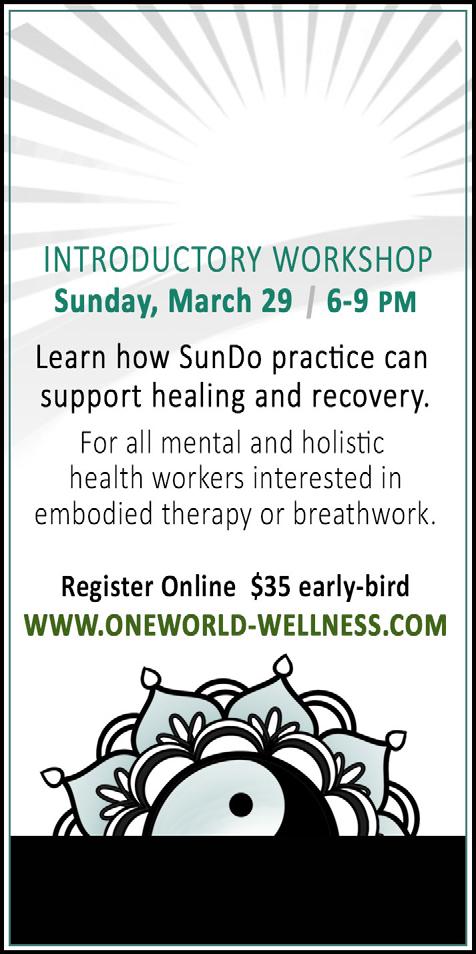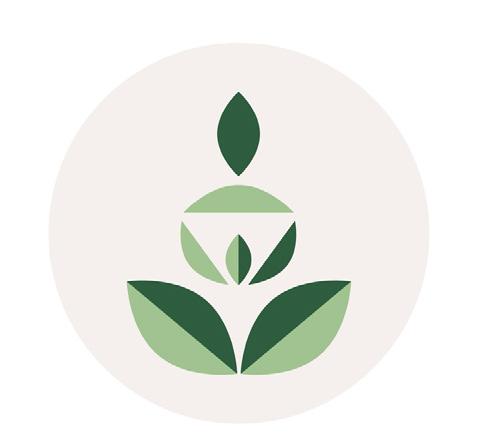
10 minute read
ROOTED IN SMART
a diet rich in processed foods, including plant-based processed options, will not lead to better health outcomes. To make a significant impact on health biomarkers, you need to consume a nutrient-dense diet of unprocessed, whole foods. If you choose to adopt a vegetarian or vegan plant-based diet, vitamin B12 supplementation may also be necessary to avoid deficiency.
Rooted in Smart Nutrition Plant-Based Diet Popularity Makes Sense What About Protein? Consuming adequate protein while on a plant-based diet may be less challenging than you think. The recommended daily allowance (RDA) for protein is a modest 0.8 grams per kilogram of body weight. It is important to note that this metric is not a recommendation for optimal health, but the minimum amount to prevent illness. For optimal health, research suggests protein levels between 0.8 to 1.0 grams per kilogram for average healthy adults and
Advertisement
The increased popularity of plantbased diets can be attributed to the myriad of health benefits ranging from improved longevity to chronic disease prevention. If you are considering adopting such a diet, it is important to learn about what plant-based eating looks like, potential risks, concerns regarding protein and digestion, as well as practical tips to increase your plant consumption.
What Is a Plant-Based Diet? A standardized definition of a plant-based diet has yet to be agreed upon by governing agencies, making the recommendation of a plant-based diet ambiguous and open to interpretation. For example, the Mediterranean, vegan and vegetarian diets all could be considered plant-based. Research suggests people who consume a majority of their dietary intake from plants tend to have a lower body mass index as well as lower rates of obesity,
by Dr. Amanda Gomes
diabetes and heart disease than those who consume diets not based on plants. Considering this data, an acceptable interpretation of a healthful, plant-based diet is rich in unprocessed whole foods including vegetables, fruits, legumes, nuts, seeds and whole grains. It would not necessarily mean a diet devoid of meat, seafood or dairy, merely limiting these and other processed foods. Although plant-based diets are promoted for favorable health outcomes, it is important to recognize the difference between consuming healthy, whole foods and unhealthy, processed foods, regardless of the origin. Similar to the standard American diet, plant-based diets can include highly processed options of less nutritional value. A cross-sectional study comparing vegetarian and omnivorous adults found diet quality was more important than diet categorization. Simply stated, consuming 1.0 to 2.2 grams per kilogram for training athletes. Plant sources rich in protein include tempeh, tofu, lentils, beans, hemp, quinoa and nuts. Their prospective protein contents range from approximately 13 grams to 5 grams per serving. Consuming a wide variety of whole grains, vegetables, nuts, seeds, legumes and fruit has been shown to render protein combining unnecessary, as it is more likely you will consume all your essential amino acids by eating broadly. When done thoughtfully, people can consume their protein exclusively from plant sources; however, that is not a requirement for following a healthful, plant-based diet.
Digestive Support Digestion can be impacted when implementing new dietary choices. A few helpful considerations to improve the digestion Mikos/Bigstock.com
of a plant-based diet include adequate hydration and soaking plant proteins prior to consumption. Among many other essential nutrients for health, plants are rich in fiber. By increasing your daily consumption of plants, you also will be increasing your daily fiber intake. To prevent unpleasant bloating or constipation often associated with increased fiber, ensure you are adequately hydrated. Drink half of your body weight in ounces slowly throughout the day (i.e. a 150-pound individual would aim for 75 ounces of filtered water per day). This will assist in elimination as well as many other important physiologic processes. In addition to adequate hydration, it is beneficial to soak plant proteins before consumption. In nature, dormant seeds require an energy source prior to sprouting. This vital role is played by phytates. Although essential for seed survival, phytates reduce the digestibility of starches, fats, and proteins. This undesirable effect can be avoided by soaking nuts, seeds, beans and grains prior to consuming them. When soaked, these nutritional inhibitors are reduced and digestibility is improved, reducing unpleasant gastrointestinal symptoms.
Practical Ways to Increase Your Plant Consumption
n Reformulate your plate. Challenge the thought pattern of centering your meals around an animal protein. Instead, focus on plant-based foods, allowing them to comprise ⅔ of your plate. This simple composition change will not only increase meal variety, but also help you reach your health goals.
n Eat more vegetables. Vegetables are rich in vitamins, minerals, fiber and phytonutrients, making them the keystone of a healthful, plant-based diet. Get creative! Consider menu items like soups, salads, scrambles, smoothies and stir-fries to boost your vegetable intake without losing interest.
n Try a meatless meal. Begin by planning a meatless meal once per week. This suggestion may seem challenging, but several cultures have been eating this way for centuries. Follow your palate and explore different cuisines. Fortunately, healthy plant-based recipes are easier than ever to come by via an internet search.
n Fruit for dessert. Attempt to draw inspiration from the old adage, “Fruit is nature’s dessert.” Enjoying whole fruit desserts, like poached pears or spiced plums, can be decadent without thwarting your health goals. As winter draws to a close, try rhubarb or apple as a nutrient-dense and satisfying dessert. In summary, plant-based diets are a great way to reduce your risk for illnesses such as cardiovascular disease, diabetes and obesity. Placing your dietary focus on vegetables, fruits, legumes, nuts, seeds and whole grains will broaden your food diversity and help you see greater health outcomes.
Dr. Amanda Gomes is a naturopathic physician and nutritionist at Collaborative Natural Health Partners with locations in Manchester, West Hartford and Stonington. All of the physicians at the clinic are in-network providers for most insurance companies and are accepting new patients. Call 860-533-0179 to book an appointment and visit CTNaturalHealth.com for more information.
Thousands of Years of Food Wisdom in Twelve Months
The Institute of Sustainable Nutrition Offering a One-Year Certification Program in Sustainable Health & Nutrition This Innovative School Integrates the Science of Nutrition with:
Embark on this life-altering journey and be part of the movement to change the paradigm of our food for future generations. Join our experienced staff one weekend a month as you use hands-on education to delve into and explore diverse aspects of how food and herbs enhance the health of your clients, friends, family, yourself and the environment. Practicing Sustainable Gardening Methods Learning Kitchen Culinary Skills Identifying Nutrient-rich Wild Plants Preparing Traditional Kitchen Medicine
Susane Grasso
R E I K I MASTE R


Relaxation Therapy Chakra Balancing Aura Readings
203.500.6950
2489 Boston Post Road Suite F Guilford CT 06437
It’s not how old you are, but how you are old.
~Jules Renard
VEGAN FITNESS A Healthy Choice for Body and Planet
Tennis champion Venus Williams and New England Patriots star quarterback Tom Brady are among the athletes that opt for healthy, plantdominant diets to reach their personal best, a trend that belies some misconceptions about what it means to be vegan. “Going vegan implies a larger, lifestyle choice based on personal ethics, but athletes report that they just feel better,” says Brenda Carey, editor-in-chief of Vegan Health and Fitness Magazine. “They’re also surprised at how well they put on muscle after making this dietary change.”
A balanced vegan diet can provide everything an active body needs for muscle mass, stamina and recovery while lowering the risk of heart disease. A 2018 metaanalysis of 40 studies published in the peerreviewed journal PLOS One concludes that a plant-powered diet fosters a healthier cardio-metabolic profile. According to Dutch researchers, amping up nutrition from plants may also lower the risk of insulin resistance and Type 2 diabetes. Devotees report unexpected perks.
“I recover faster. I also have more natural energy without the need for caffeine and reduced inflammation, as confirmed by Marlaina Donato
in blood tests,” says Matt Tullman, managing partner of the community-building website NoMeatAthlete.com and CEO of vegan supplement maker Complement, in Boulder, Colorado. Nutritional Superpowers Bolstering the diet with foods like quinoa, chia seeds, nut butters and vegan energy powders, as well as combining foods for a more complete protein profile, is important. For example, pairing whole-grain rice with beans makes a complete protein, says Stefanie Moir, international vegan fitness coach and founder of VeganAesthetics. co.uk, in Glasgow, Scotland. “Eating a wide variety of foods across the plant kingdom ensures that you reach your fitness goals,” says Moir, who trains six days a week and opts for a breakfast of oats with nut butter and chia seeds. “If you want a ‘superfood’ component, you can add cacao powder for antioxidants and a great chocolate taste.”
Tullman acknowledges that there are some exceptions to protein requirements— especially for the elderly, individuals with certain chronic diseases and pregnant women—but he notes that daily protein
needs are less than we’ve been conditioned to believe. “If you track your macronutrients through a day, you’ll find that you’re getting adequate protein.”
Professional bodybuilder Torre Washington, in Tamarac, Florida, keeps it simple. “We’re all unique individuals, so it’s up to each person to test things without fear of lack.” The National Academy of Sports Medicine-certified coach loves antioxidant-rich blueberries, filling apples and potassium-packed bananas, and tends to choose calorically lower, nutritionally dense foods during periods that he’s competing.
Carey suggests vegan meal delivery services as an option and vegan-friendly restaurants in a pinch, but attests to an easy system of meal prep for consistency. “Some people like to meal prep one day a week— cooking brown rice, quinoa and chopping veggies. This way, you can just throw it together when it’s time to eat,” she says. “You can also eat more simply and throw a bunch of yummy fruits or veggies into the blender for smoothies or soups.” For added fortification, some experts recommend supplementing with vegan sources of vitamin B 12 , especially for active women in their child-bearing years and older individuals, because B 12 absorption is compromised as we age. Adding a vegan source of vitamin D is also a wise choice if exposure to natural sunlight is not adequate.
The Big Picture For the vegan athlete, workout gear that doesn’t contain wool or leather is the way to go. “Making conscious choices expands beyond your plate, and a lot of brands have vegan-friendly shoes,” says Moir.
“The difference between ‘plant-based’ and ‘vegan’ has to do with ethical motivations and treatment of animals,” says Tullman. “Natural fibers such as cotton and synthetic fabrics like polyester are fine.”
The path of vegan fitness can not only offer health benefits, but also a personal connection to the Earth. “It’s given me an opportunity to share my journey with others and to allow them to reach their own specific goals,” says Washington. “Mentally, it’s given me more depth of thought and spiritually connected me with the ‘YOUniverse’ as a whole.”
Marlaina Donato is the author of several books and a composer. Connect at AutumnEmbersMusic.com.
SUNDO HORIZONS







967 N. HIGH STREET, EAST HAVEN ONE WORLD WELLNESS STUDIO

Your Market is Our Readers. Let Us Introduce You to Them!

To advertise call 203-305-5531.

SKILLED MASSAGE ORGANIC FACIALS COMMUNITY ACUPUNCTURE PHARMACEUTICAL-GRADE CBD CBD MASSAGE








